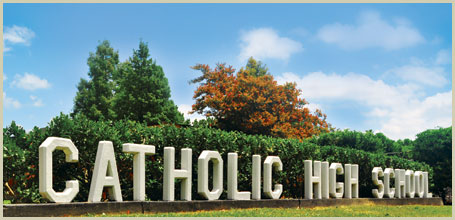“Take care and be earnestly on your guard not to forget the things which your own eyes have seen, nor let them slip from your memory as long as you live, but teach them to your children and to your children’s children.” (Deuteronomy 4:5-9)
There are two equal and opposite mistakes people often make about Catholic secondary education – both well intentioned, both fatal for the future of the Church.
The first mistake is to treat Catholic secondary education as if it were public school with a Mass and then to start thinking about a Catholic high school the way many people think about other high schools: as merely a means for getting into a “good college.” You have to keep your grades “up,” but those grades are often disassociated from any actual skill at things like reading complex books, writing literate prose, or making a solid argument. “Keeping one’s grades up” for people who hold this view often has more to do with parents and principals browbeating high school teachers into raising grades and lowering expectations than with students mastering a subject.
Some people appear to assume that some magic transformation will happen in college. Bored students, abused by years of second-rate education, will blossom miraculously in four short years. I teach in a college. I’m not saying it never happens, but it’s like thinking you can send your son to college to learn to be a pro basketball player. Most players, even very good ones, don’t make it beyond college ball. And if they’re not very good when they go in, it’s highly unlikely they’ll get the chance to improve in that sink-or-swim environment. Students struggling to get C’s doing high school-level work rarely get A’s doing college-level work.
While proponents of this first view sometimes think it’s a good thing for students to go to Mass and Confession, they rarely believe that courses in theology are worth much time or effort. The substance of theology, centuries of high-level intellectual effort and profound reflection, counts for little, it seems. It’s only important that the theology teacher go to student sports and theater productions, be supportive, and show that theology (God, the Church) cares.
But God help the teacher whose low grade in theology endangers a son or daughter’s prospects at a “top school”! Hell hath no fury like a parent whose hopes for a scholarship are dashed by a low-grade in. . .theology. It’s like being denied Harvard because you got a low grade in basket weaving. The indignity! The absurdity!
A less common mistake (opposite in one way but that ends up reinforcing the first), is made by people who care little about the intellectual formation of the students as long as the school is “getting them into heaven.” As long as there is Mass and Confession and the priest or sisters seem orthodox, then all is well. Whether students in the school are actually learning anything; whether anyone is cutting through the heavy layers of teen cynicism and the white noise of the culture; whether they are learning to live as Christian-Catholics by desire and design and not merely by default – these are questions too rarely asked. If the school announces itself as “orthodox,” then it’s supposed to be fine.
Neither party seems to care much for a distinctively Catholic education: that profound and systematic search for an understanding of faith which has inspired centuries of great minds from Justin Martyr to Augustine, John Chrysostom, Thomas Aquinas, Bonaventure, Dante, Theresa of Avila, Newman, Pieper, Chesterton, and Pope Saint John Paul the Great. It was the faith in the ultimate unity of truth that gave rise in the Middle Ages to that venerable institution, the university. Centuries of the most profound reflections on the human condition, and most of it relegated to dusty bookshelves in a backroom in favor of hugs, sports teams, STEM, and yet another school assembly on sexual ethics.
There is nothing wrong with any of these things, but when you get kids in college who read and write at a sixth- or seventh-grade level (no more than five pages of reading for homework; no more than two or three sentences in an essay having to do with one another); know little more about their faith than that the Catholic Church is against abortion and pre-marital sex; can’t tell you what Pentecost is or who Abraham, Isaac, and Jacob were (this is not uncommon); and have not only never read Dante, Chesterton, or Newman, but have absolutely no idea who they are, then you suspect maybe somewhere someone had the priorities wrong.
Fulton Sheen was one of the great lights of a generation ago. He tried to impart to the lay faithful the richness of the Catholic intellectual tradition, with frequent discussions of Descartes, Pascal, Augustine, Thomas Aquinas, and many others in order to instruct the simple Catholic laborers and housewives who watched his television show. He clearly believed this was the way to help Catholics make their faith a living reality amid the complexities of the modern world.
Those with the benefit of high levels of secular education who face the challenges of a complex social and political culture need high levels of understanding of their faith; otherwise the faith will soon seem childish and decay into a dead letter, an empty shell: Catholicism with no conviction.
When will Catholic schools once again have the faith Fulton Sheen did in the inherent intelligence of the lay faithful sufficient enough to throw out the boring, empty trash they traffic in now – in order to give young people the real thing? A hundred pages of any modern theology textbook will never be worth a single page of Augustine’s Confessions, John of the Cross’s Dark Night of the Soul, or the Gospel of John.
Such an education is our children’s birthright. Only a fool would sell it off for a mess of pottage.
















